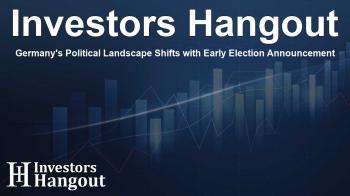Germany's Political Landscape Shifts with Early Election Announcement

Germany's National Parliament Has Been Dissolved
The political dynamics in Germany are shifting as President Frank-Walter Steinmeier has made the significant decision to dissolve the national parliament. This pivotal move has set a date for a snap election, bringing the political landscape into the spotlight.
Chancellor Scholz's Coalition Faces Challenges
Chancellor Olaf Scholz, representing the Social Democrats, recently faced critical challenges leading to the dissolution of his coalition government. After dismissing Finance Minister Christian Lindner from the Free Democrats due to disagreements over government borrowing, the coalition lost its grip on parliamentary majority.
The Current Political Climate
Now, with this unexpected turn of events, the stage is set for a national election that will take place several months earlier than planned, aligning with Scholz's dwindling authority. Political analysts are closely observing the upcoming vote, scheduled for February, as party dynamics continue to evolve.
Implications for Major Political Parties
As the clock ticks down to the election, the main opposition party led by Friedrich Merz has gained momentum, significantly leading in the polls. Currently, Scholz's SPD finds itself in third place, trailing behind the far-right Alternative for Germany party.
Potential Outcomes for Party Alliances
The Greens, part of Scholz's previous alliance, currently receive around 13% of voter support, but the Free Democrats are precariously placed, polling at 4% and facing the possibility of not reaching the critical 5% threshold needed for parliamentary representation.
Future Strategies for the SPD
Lars Klingbeil, co-leader of the SPD, remains optimistic. He believes that the party can close the gap with the conservatives as the election date approaches. Historical data indicates potential as they previously outperformed expectations in the 2021 elections, securing nearly 26% of votes in the closing weeks of their campaign.
Voters' Reactions and Political Stability
With these developments, voters are contemplating the future of governance and political stability in Germany. The SPD's ability to regain strength in the upcoming months could reshape the power dynamics significantly.
Frequently Asked Questions
What led to the dissolution of the German parliament?
The German parliament was dissolved following Chancellor Olaf Scholz's dismissal of Finance Minister Christian Lindner, resulting in a lack of majority support.
When is the scheduled snap election?
The snap election is scheduled for February 23.
Which party is currently leading in the polls?
The main opposition party, led by Friedrich Merz, is currently leading significantly in the polls.
What is the polling status of the SPD?
The SPD is currently in third place, trailing both the far-right Alternative for Germany party and the Greens.
Can the SPD regain its strength before the elections?
Co-leader Lars Klingbeil believes the SPD can close the gap with the conservatives as the election date approaches and has potential to be a strong contender again.
About Investors Hangout
Investors Hangout is a leading online stock forum for financial discussion and learning, offering a wide range of free tools and resources. It draws in traders of all levels, who exchange market knowledge, investigate trading tactics, and keep an eye on industry developments in real time. Featuring financial articles, stock message boards, quotes, charts, company profiles, and live news updates. Through cooperative learning and a wealth of informational resources, it helps users from novices creating their first portfolios to experts honing their techniques. Join Investors Hangout today: https://investorshangout.com/
Disclaimer: The content of this article is solely for general informational purposes only; it does not represent legal, financial, or investment advice. Investors Hangout does not offer financial advice; the author is not a licensed financial advisor. Consult a qualified advisor before making any financial or investment decisions based on this article. The author's interpretation of publicly available data shapes the opinions presented here; as a result, they should not be taken as advice to purchase, sell, or hold any securities mentioned or any other investments. The author does not guarantee the accuracy, completeness, or timeliness of any material, providing it "as is." Information and market conditions may change; past performance is not indicative of future outcomes. If any of the material offered here is inaccurate, please contact us for corrections.
